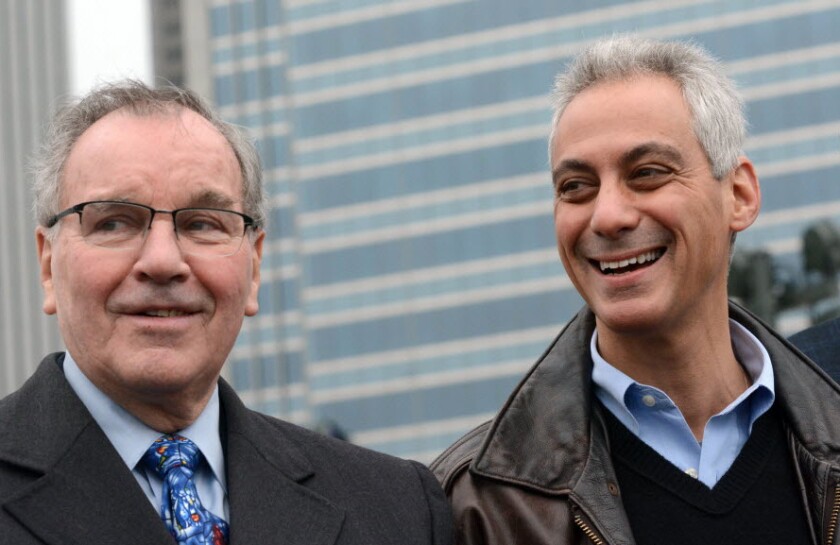Mayor Rahm Emanuel on Thursday blamed his predecessor and political mentor for the avalanche of tax increases needed to solve Chicago’s $36 billion pension crisis without uttering the name of former Mayor Richard M. Daley.
“I would love nothing else in my life if somebody else had done it. … The question isn’t what I did. Part of the question has to be what wasn’t done beforehand that required that action” the mayor said during a taping of the WLS-AM (890) Radio program, “Connected to Chicago,” to be broadcast at 7 p.m. Sunday.
“Had this been taken care of before, it would have been taken care of at a much cheaper price. People chose their politics over the progress of the city. They kicked the can down the road. … I did not create it. But I was gonna be determined to do something different, which is to fix it.”
Emanuel has spent the last seven years criticizing and undoing virtually everything Daley did without criticizing him by name.
That’s the unwritten agreement the two men made in exchange for what appeared to many Chicagoans to be an orchestrated election that saw William Daley replace Emanuel as White House chief-of-staff under then-President Barack Obama and Emanuel take Richard M. Daley’s place at City Hall.
But Daley’s decision to punt the pension crisis to his successor left Emanuel holding the bag and doing the heavy lifting.
He’s identified dedicated funding sources for all four city employee pension funds. But Chicago taxpayers have paid a heavy price.
They’ve been hit with $1.2 billion in property tax increases for police, fire and teacher pensions; a 29.5 percent tax on water and sewer bills to save the Municipal Employees pension fund and a 56 percent and 28.2 percent increases in the monthly tax tacked on to telephone bills — on cellphones and land lines — for the Laborers Pension fund.
After the election, Chicago homeowners and businesses face yet another property tax increase for police and fire pensions in 2020 — and another hike the following year in the tax tacked onto water and sewer bills to save the Municipal Employees pension fund.
Following five-year “ramp-up” periods, additional increases will be needed to honor the city’s statutory promise to keep all four city government pension funds on the road to 90 percent funding by 2048.
By the city’s own estimate, police and fire pension costs will rise by $297.3 million, or 36 percent, in 2020. The Municipal and Laborers plan costs will grow by $330.4 million, or 50 percent, in 2022.
On Thursday, Emanuel didn’t want to talk about how he will fill those daunting funding gaps. He would only say, “At the right time and place, we’ll deal with that.”
He was more interested in dodging the blame for the mountain of tax increases he has already imposed. And pointing the finger of blame at Daley — without saying his name.
“In 2007, the pension [shortfall] was, by the pension commission’s [estimate] like $400 million. By the time I came, fixing it was about $1.2 billion,” the mayor said.
Emanuel noted that he negotiated cost-saving concessions with organized labor. But the Illinois Supreme Court overturned that plan. The only alternative was to raise taxes.
“Had we tried to kick the can down further, not only would the pensions have been in real hock,” he said. “So would the whole city. … I had no desire having to do what I had to do. But the road had basically come to an end of playing politics and letting somebody else fix it.”
In 2007, Daley created a 32-member commission drawn from labor, business and banking to confront a problem that threatened to choke future generations of Chicago taxpayers: underfunded city employee pension funds.
Daley said then that the comprehensive solution he was seeking could include everything from benefit reductions and increased employee contributions to a higher retirement age and a shift away from “defined benefit” pension plans and toward the “defined contributions” or 401(k) plans favored by private industry.
“I hope it’s controversial. It has to be. If it’s not controversial, then it’s not worth anything. A lot of people will not be happy,” Daley said then.
It wasn’t controversial. Daley wouldn’t let it be controversial. Instead, it turned out to be an exercise in political avoidance.
After two years of study, the commission concluded that reduced employee benefits, higher worker contributions and “new revenue” would be needed to bail out four city employee pension funds then due to run out of money by 2030.
But there were no specific recommendations about what revenues to raise. Just a definition of the gaping need.






